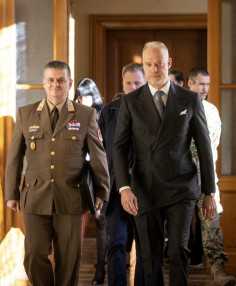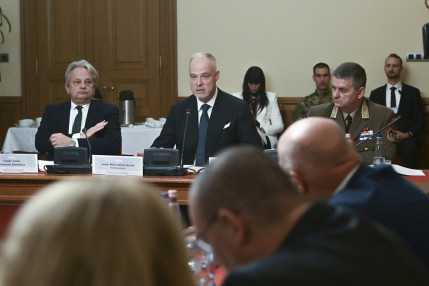Epochal change underway in the Hungarian military
Text: honvedelem.hu/MTI | Photo: Gábor Kormány, Szilárd Koszticsák/MTI | 11:12 November 20, 2023An epochal change is currently under way in the Hungarian military – stated Defence Minister Kristóf Szalay-Bobrovniczky during his annual hearing before the Defence and Law Enforcement Committee of the National Assembly on Thursday, 16 November.

The minister added that the Hungarian people rightfully expect the armed organization dedicated to guaranteeing the sovereignty of the country as well as the people’s security and lives to guarantee all this at the highest level possible, together with its allies. He pointed out that everything they do, they do it in the interest of achieving this goal. One of the concomitants of this process must be the Hungarian Defence Forces’ becoming a premier force in the region during their development, one that is authoritative and is able to show proper deterrent power – said the minister.
He added that “waking” the military from the earlier peacetime status requires a complete transformation, so that it can become a focused, live, combat-ready, properly armed and well-trained force.
The minister recalled that the security situation of Hungary has deteriorated since his appointment; the Russo-Ukrainian War is still going on, in which the Hungarian government stands on the side of peace, and is resolutely committed to ceasefire and peace talks as soon as possible. He noted that the southern border of Hungary is being kept under pressure by illegal migrants with traceable links to actors in terrorism. Besides, some weeks ago the Middle East got “engulfed in flames”, “there is a stirring” in the Far East, whereas in Africa one can witness a wave of coups with strengthening fundamentalism and Islamic terrorism in their wake. These are possible sources of danger that have escalation potential within themselves, he noted.
He said that Hungary had already attained the goal of spending 2 per cent of its GDP on defence and so meets the NATO guideline target a year earlier than planned. He noted that he considers this 2 per cent as a threshold rather than a ceiling, which is needed indeed in order to create the modern, digital armed forces of Hungary that use military equipment instead of personnel wherever it is possible. As he said, more than 20 per cent of the defence budget is being allocated to developments, since the “rearmament” of the military is under way as new, NATO-compatible hardware keeps flowing in to replace obsolete technologies.
He pointed out that the government is serious about the NATO commitment of the country, because this provides the international guarantee of our security, and therefore Hungary as a committed ally stands by a functioning NATO with financial resources and participation in foreign missions. He noted that we must not only focus on the danger from the east, but also keep paying attention to the threat from the south. For example, Hungary is present in the NATO mission providing stability in the Western Balkans, as well as in EUFOR Operation Althea, the EU’s mission in Bosnia-Herzegovina, where Hungarian Major General Dr. László Sticz will assume command as of next year.
He added that Chad is the bastion of the Sahel and its status directly influences Hungary’s security situation, so the government is going to send a 200-strong military contingent to the country.
The minister said that the procurement of new equipment is continuous in the Hungarian Defence Forces, and the government intends to connect the development of the armed forces with economic development through the defence industry. The minister called defence innovation another important area, where the aim is to get the Hungarian enterprises involved.

Kristóf Szalay-Bobrovniczky also said that General Dr. Gábor Böröndi had become the new Chief of HDF General Staff in April, and that he expects him to raise the military from a tactical to an operational level.
He also noted that the recently started Exercise Adaptive Hussars 23 – the largest-scale military maneuvers in the modern-day history of Hungary – was being conducted together with the allies, and got the entire Hungarian Defence Forces moving.
Among the organizational changes affecting the military, he mentioned the alignment of the system of territorial defence with the armed forces and the graded salary increase that entailed a substantial real wage growth in the sector. Speaking about the introduction of defence service remunerations, he said that this is a worthy and equitable allowance, and the “rejuvenation” was necessary for “creating” modern and physically fit commanders for the use of new military equipment who speak languages, are able and willing to act on their own initiative, take responsibility and have a mindset that is adaptable to the needs of the 21st century.
He said that they had switched strategy in the field of recruitment by starting marketing campaigns and recruiting soldiers to the Hódmezővásárhely-based Lynx battalion with an outstanding gross salary offer of HUF 737,000. As a result, the current personnel strength of the brigade is at 90 per cent. He said that in order to bring the Tata artillery battalion to full strength, they were to launch another similar program on that day, to which the minister invited the members of Parliament as well.
In answer to a question from Committee Chairman Lajos Kósa, the minister said that he can sense the support that the society is giving to the Hungarian Defence Forces, and thanked the youth for having undertaken to join the armed forces as professional soldiers or reservists. Answering another question from the chairman, he also said that they intend to build the lessons of the war into the development program of the Hungarian armed forces, and mentioned, by way of example, the procurement of unmanned combat aerial vehicles (UCAV).
The committee voted 6 to 1 to accept the minister’s report.